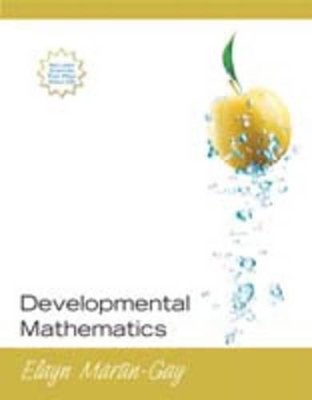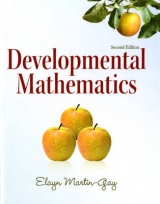
Developmental Mathematics (paperback edition)
Pearson
978-0-13-229090-6 (ISBN)
- Titel erscheint in neuer Auflage
- Artikel merken
Elayn Martin-Gay, University of New Orleans An award-winning instructor and best-selling author, Elayn Martin-Gay has taught mathematics at the University of New Orleans for more than 25 years. Her numerous teaching awards include the local University Alumni Association’s Award for Excellence in Teaching, and Outstanding Developmental Educator at University of New Orleans, presented by the Louisiana Association of Developmental Educators. Prentice Hall is pleased to announce the new Third Editions of Basic College Mathematics, Introductory Algebra, Intermediate Algebra, and Algebra A Combined Approach and two new first editions, Basic College Mathematics with Early Integers, and Developmental Mathematics. Elayn Martin-Gay also authors a best-selling ©2005 hardback series in developmental mathematics. Prior to writing textbooks, Elayn developed an acclaimed series of lecture videos to support developmental mathematics students in their quest for success. These highly successful videos originally served as the foundation material for her texts. Today, the videos are specific to each book in the Martin-Gay series. Elayn also originated the Chapter Test Prep Video CDs to help students during their most “teachable moment” ---as they prepare for a test. Elayn’s experience has made her aware of how busy instructors are and what a difference quality supports make. For this reason, she created the Instructor-to-Instructor video series. These videos provide instructors with suggestions for presenting specific math topic and concepts in basic mathematics, prealgebra, beginning algebra, and intermediate algebra. Seasoned instructors can use them as a source for alternate approaches in the classroom. New or adjunct faculty may find the CDs useful for review. They are a great resource for suggestions regarding areas they may wish to emphasize, or common trouble areas students experience, that instructors my wish to highlight. With her textbooks series, the Chapter Test Prep Video Cd, and CD Lecture series, Elayn has sought to put success within the reach of every student and instructor.
Chapter 1-The Whole Numbers
1.1 Tips for Success in Mathematics
1.2 Place Value and Names for Numbers
1.3 Adding Whole Numbers and Perimeter
1.4 Subtracting Whole Numbers
1.5 Rounding and Estimating
1.6 Multiplying Whole Numbers and Area
1.7 Dividing Whole Numbers
Integrated Review — Operations on Whole Numbers
1.8 An Introduction to Problem Solving
1.9 Exponents, Square Roots, and Order of Operations
Chapter 2 — Multiplying and Dividing Fractions
2.1 Introduction to Fractions and Mixed Numbers
2.2 Factors and Prime Factorization
2.3 Simplest Form of a Fraction
Integrated Review — Summary on Fractions, Mixed Numbers, and Factors
2.4 Multiplying Fractions
2.5 Dividing Fractions
Chapter 3 — Adding and Subtracting Fractions
3.1 Adding and Subtracting Like Fractions
3.2 Least Common Multiple
3.3 Adding and Subtracting Unlike Fractions
Integrated Review — Operations on Fractions and Mixed Numbers
3.4 Adding and Subtracting Mixed Numbers
3.5 Order, Exponents, and the Order of Operations
3.6 Fractions and Problem-Solving
Chapter 4 — Decimals
4.1 Introduction to Decimals
4.2 Order and Rounding
4.3 Adding and Subtracting Decimals
4.4 Multiplying Decimals and Circumference of a Circle
Integrated Review — Operations
4.5 Dividing Decimals and the Order of Operations
4.6 Fractions and Decimals
Chapter 5 — Percent
5.1 Ratio and Proportion
5.2 Introduction to Percent
5.3 Percents and Fractions
5.4 Solving Percent Problems Using Equations
5.5 Solving Percent Problems Using Proportions (discussion of ratio)
Integrated Review — Percent and Percent Problems
5.6 Applications of Percent
5.7 Percent and Problem Solving: Sales Tax, Commission, and Discounts
5.8 Percent and Problem Solving: Interest
Chapter 6 — Geometry
6.1 Lines and Angles
6.2 Plane Figures and Solids
6.3 Perimeter
6.4 Area
6.5 Volume
Integrated Review — Geometry Concepts
6.6 Square Roots and Pythagorean Theorum
6.7 Congruent and Similar Triangles
Chapter 7 — Statistics and Probability
7.1 Reading Pictographs, Bar Graphs, Histograms, and Line Graphs
7.2 Reading Circle Graphs
Integrated Review — Reading Graphs
7.3 Mean, Median, and Mode
7.4 Counting and Introduction to Probability
Chapter 8 — Real Numbers and Introduction to Algebra
8.1 Symbols and Sets of Numbers
8.2 Exponents, Order of Operations, and Variable Expressions
8.3 Adding Real Numbers
8.4 Subtracting Real Numbers
Integrated Review — Operations on Real Numbers
8.5 Multiplying and Dividing Real Numbers
8.6 Properties of Real Numbers
8.7 Simplifying Expressions
Chapter 9-Equations, Inequalities, and Problem Solving
9.1 The Addition Property of Equality
9.2 The Multiplication Property of Equality
9.3 Further Solving Linear Equations
Integrated Review — Solving Linear Equations
9.4 An Introduction to Problem Solving
9.5 Formulas and Problem Solving
9.6 Percent and Mixture Problem Solving
9.7 Solving Linear Inequalities (no interval notation yet)
Chapter 10-Graphing Equations and Inequalities
10.1 The Rectangular Coordinate System
10.2 Graphing Linear Equations
10.3 Intercepts
10.4 Slope and Rate of Change
10.5 Equations of Lines
Integrated Review — Summary on Linear Equations
10.6 Introduction to Functions
10.7 Graphing Linear Inequalities in Two Variables
10.8 Direct and Inverse Variation
Chapter 11-Systems of Linear Equations
11.1 Solving Systems of Linear Equations by Graphing
11.2 Solving Systems of Linear Equations by Substitution
11.3 Solving Systems of Linear Equations by Addition
Integrated Review —Summary on Solving Systems of Equations
11.4 Systems of Linear Equations and Problem Solving
Chapter 12-Exponents and Polynomials
12.1 Exponents
12.2 Negative Exponents and Scientific Notation
12.3 Introduction to Polynomials
12.4 Adding and Subtracting Polynomials
12.5 Multiplying Polynomials
12.6 Special Products
Integrated Review — Exponents and Operations on Polynomials
12.7 Dividing Polynomials
Chapter 13-Factoring Polynomials
13.1 The Greatest Common Factor and Factoring by Grouping
13.2 Factoring Trinomials of the Form x2 + bx + c
13.3 Factoring Trinomials of the Form ax2 + bx + c
13.4 Factoring Trinomials of the Form ax2 + bx + c by Grouping
13.5 Factoring Perfect Square Trinomials and the Difference of Two Squares
Integrated Review–Choosing a Factoring Strategy
13.6 Solving Quadratic Equations by Factoring
13.7 Quadratic Equations and Problem Solving
Chapter 14- Rational Expressions
14.1 Simplifying Rational Expressions
14.2 Multiplying and Dividing Rational Expressions
14.3 Adding and Subtracting Rational Expressions with the Same Denominators and Least Common Denominator
14.4 Adding and Subtracting Rational Expressions with Different Denominators
14.5 Solving Equations Containing Rational Expressions
Integrated Review–Summary on Rational Expressions
14.6 Problem Solving with Rational Equations
14.7 Simplifying Complex Fractions
Chapter 15- Roots and Radicals
15.1 Introduction to Radicals
15.2 Simplifying Radicals
15.3 Adding and Subtracting Radicals
15.4 Multiplying and Dividing Radicals
Integrated Review — Simplifying Radicals
15.5 Solving Equations Containing Radicals
15.6 Radical Equations and Problem Solving
Chapter 16-Quadratic Equations and Nonlinear Graphs
16.1 Solving Quadratic Equations by the Square Root Property
16.2 Solving Quadratic Equations by Completing the Square
16.3 Solving Quadratic Equations by the Quadratic Formula
Integrated Review–Summary on Quadratic Equations
16.4 Graphing Quadratic Equations in Two Variables
16.5 Interval Notation, Finding Domain and Range from Graphs, and Graphing Piece-wise Defined Functions
Appendices:
Appendix A Further Algebraic Topics 1. Factoring Sums and Differences of Cubes
2. Sets and Compound Inequalities
3. Absolute Value Equations and Inequalities
4. The Distance and Midpoint Formulas
5. Writing Equations of Parallel and Perpendicular Lines
6. Nonlinear Inequalities in One Variable
7. Rational Exponents
8. Systems of Linear Inequalities
Appendix B Tables
1. Squares and Square Roots
2. Percent, Decimal, and Fraction Equivalents
3. Compound Interest
Appendix C The Bigger Picture
1. Operations on Sets of Numbers and Solving
Equations
2. Simplifying Expressions and Solving Equations
and Inequalities
Appendix D Further Geometric Topics
1. Length: U.S. and Metric Systems
2. Weight and Mass: U.S. and Metric Systems
3. Capacity: U.S. and Metric Systems
4. Surface Area
Appendix E Inductive and Deductive Reasoning
Appendix F Sample THEA Test
| Erscheint lt. Verlag | 15.8.2007 |
|---|---|
| Sprache | englisch |
| Maße | 276 x 273 mm |
| Gewicht | 2447 g |
| Themenwelt | Mathematik / Informatik ► Mathematik |
| ISBN-10 | 0-13-229090-1 / 0132290901 |
| ISBN-13 | 978-0-13-229090-6 / 9780132290906 |
| Zustand | Neuware |
| Haben Sie eine Frage zum Produkt? |
aus dem Bereich

